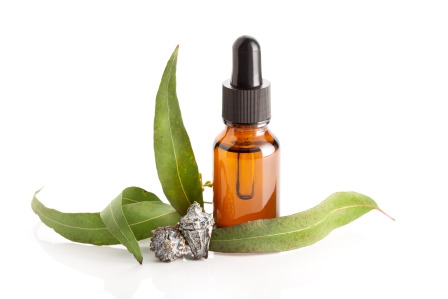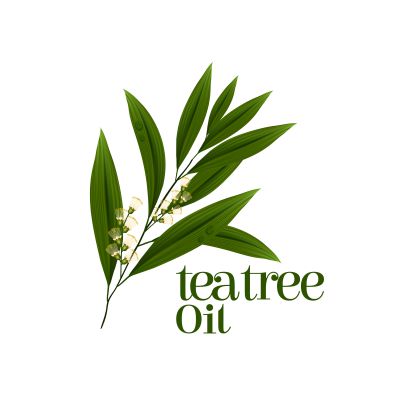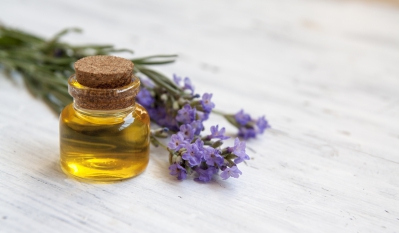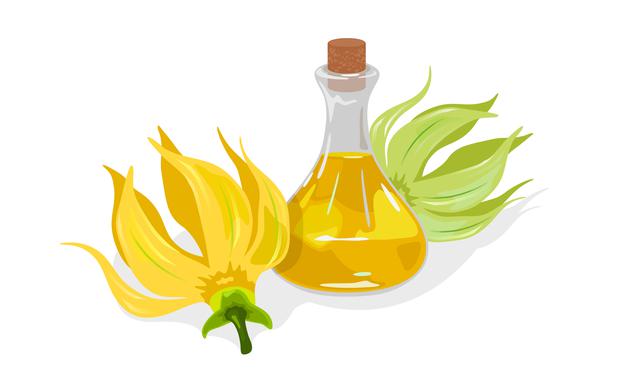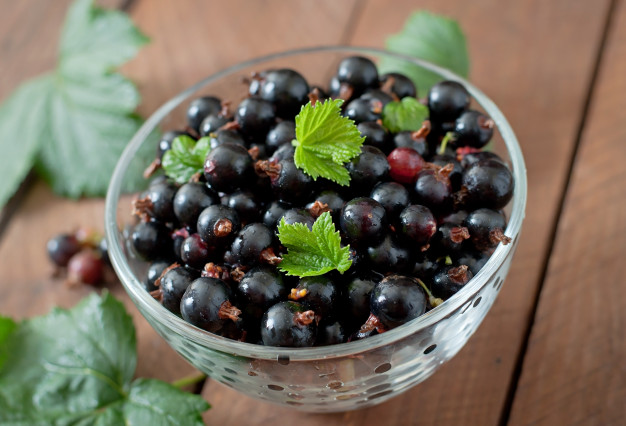Eucalyptus oil is an imperative essential oil, derived from the leaves of eucalyptus tree. It is well known for its medicinal property.
Characteristics
- It is liquid in room temperature
- It is basically colorless but obtains a yellowish color with age
- Three types of eucalyptus oil are commonly found, which include Eucalyptus Globulus or blue gum eucalyptus, Eucalyptus Citriodora or lemon eucalyptus and Eucalyptus Radiata or narrow-leaved eucalyptus
- It has a citrusy, minty and woody flavor
Nutritive value
- It contains various biologically active compounds, which are responsible for exerting antioxidant, anti-inflammatory, antimicrobial and anti-carcinogenic activities. These compounds include 1,8-cineole, citronellyl acetate, linalool, aromadendrene, citronellol, alloocimene, limonene, γ-terpinene, p-cymene, citronellal, β-pinene, eucamalol and α-terpinol
- The most important chemical components of eucalyptus oil are alpha-terpineol and eucalyptol, which are responsible for giving the oil a cooling and soothing vapor
Extraction of Eucalyptus oil
In laboratory
It is generally extracted through steam evaporation or by solvent extraction method
In home
It can be easily prepared by using the following steps –
- At first fresh eucalyptus leaves should be collected and washed properly
- It should be rinse properly and allowed to dry. It is better to use dry clean cloth for facilitating drying
- Then the eucalyptus leaves should be chopped through knife or crushed by hands
- Then some carrier oil should be taken such as olive oil or coconut oil, which should be then mixed with eucalyptus leaves and kept in a crock pot
- The crock pot should be kept on a low flame and the lid should be on the top of the crock pot
- Finally, the eucalyptus oil should be poured into a jar by straining through mesh strainer

Health benefits
Anti-inflammatory activity
- It has strong anti-inflammatory activities, which are very effective to reduce swelling, inflammation and pain
- It also exerts a cooling effect on muscle that helps to reduce muscular inflammatory events and muscle pain
- It has seen that inhalation of eucalyptus oil for successive three days after knee replacement surgery is very effective for reducing patient’s pain
Antimicrobial activity
- 1,8-cineole, citronellol, α- terpinol, citronellyl acetate, aromadendrene, γ-terpinene, limonene, citronellal, linalool, alloocimene, p-cymene, β- pinene and eucamalol components of eucalyptus oil show potent antimicrobial activities
- It acts as a strong antibiotic and helps to prevent various infectious diseases caused by Staphylococcus aureus and Escherichia coli
- It has also seen that inhalation of eucalyptus oil helps to prevent tuberculosis
- It shows antiviral activity especially against Herpes simplex virus and mumps virus by reducing viral replication
- It also exerts potent antifungal activities against Aspergillus flavus, Candida albicans and Aspergillus niger

Role on respiratory system
- It helps to prevent common cold and cough
- It also helps to remove mucous from chest. It has seen that inhalation of eucalyptus oil is beneficial for loosing mucous during cough and helps to expel it
- It acts as an expectorant
- It helps to improve the symptoms of bronchitis
- It also helps to improve the symptoms of asthmas by braking up mucous
- It helps in easy breathing and helps to clear stuffy nose
Role on oral health
- It has seen that usage of chewing gum containing eucalyptus oil extract is beneficial for reducing plaque formation
- It also helps to reduce gingivitis
- It helps to improve bad breath
- Its antimicrobial activity is responsible for preventing the infestation of oral microorganism and helps to maintain oral hygiene

Role on rapid wound healing
- It helps to heal wound fast
- Using of eucalyptus oil is related with reducing the susceptibility of infection at the wound site
- Its anti-inflammatory activities are responsible for accelerating the healing process
- It is also useful for healing minor burns or small injuries

Role on hair
- Eucalyptus oil is very beneficial for complete killing of lice and its egg
- It has also seen that the anti-inflammatory activities of eucalyptus oil are associated with reducing scalp inflammation and hence it is able to generate an ideal environment required for optimum hair growth
Role on skin
- It helps to treat dry skin
- Macrocarpal A component of eucalyptus oil helps in the synthesis of ceramide (fatty acid) production, which is responsible for preventing the susceptibility of developing dry skin by enhancing water holding capacity that helps to retain moisture
- It is associated with enhancing skin barrier protection
Therapeutic advantages
- Cineole component of eucalyptus oil helps to treat sinusitis (inflammation of the cavities around nasal passage)
- Inhalation of eucalyptus oil is very effective to reduce anxiety. It is beneficial to use before any surgery because it helps to keep the body calm, which facilitates the surgery
- It is also used in post portative condition. Inhalation of eucalyptus oil is beneficial for reducing post portative pain
- It helps to treat cold sore
- Application of eucalyptus oil on inflamed area is very beneficial for reducing pain due to its analgesic effects
- It is widely used to treat oral herpes
- It is used for promoting mental clarity

Other usage
- It acts as a strong disinfectant that helps to disinfect home easily
- The scent of the eucalyptus oil is acts as one of the most important tools responsible for keeping away rodent
- It also acts as an effective mosquito repellent
- It is used for preparing toothpaste
- It is also used as an ingredient for various cream or ointment that can be applied on inflamed area
- Ground eucalyptus leaves are also used in tea bags
- It is extensively used in aromatherapy
- It is also used to prepare mouth wash, chewing gum and vapor rub
Recent finding
- Recently, it has seen that food industries or pharmaceutical industries are focusing on various nano technological applications through which several nano emulsions are prepared for numerous purposes. Recent studies and researches have shown that nano emulsions contain eucalyptus oil have comparatively more antimicrobial and anti-biofilm activities against Candida albicans and gram negative bacteria than others (Salehi et al., 2019)
- Several researches have shown that eucalyptus oil contains various bioactive substances, which help in the synthesis of a number of medicinal and pharmaceutical compounds that help to fight against S. aureus and P. aeruginosa by exerting strong antimicrobial activity. They also show antioxidant activities against DPPH (2,2-diphenyl-1-picrylhydrazyl) radicals and put forth anti-carcinogenic effect against lung cancer (Adnan M, 2019)

Risk factors
- It is better to use diluted form of eucalyptus oil always because its undiluted form may cause severe toxicity
- It is estimated that usage of 2 to 3 ml of eucalyptus oil (undiluted) can cause drowsiness, dizziness and losing of muscle control. Whereas, using more than 5ml of undiluted eucalyptus oil may cause severe damage of nervous system that may lead to coma
- Excessive consumption of eucalyptus oil may also develop several health hazards like, nausea, vomiting, stomach pain, diarrhea, suffocation, and eye pupils. So, it is better to use eucalyptus oil in diluted form (combined with some carries oils) and in required amount to avoid undue health hazards
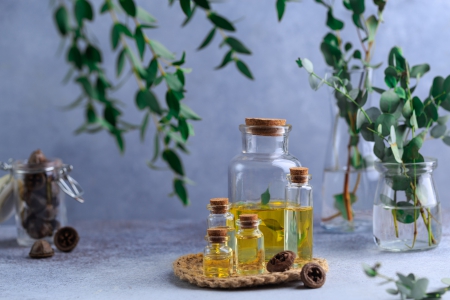
Source:
Adnan, M., 2019. Bioactive potential of essential oil extracted from the leaves of Eucalyptus globulus (Myrtaceae). Journal of Pharmacognosy and Phytochemistry, 8(1), pp.213-216.
Barbosa, L.C.A., Filomeno, C.A. and Teixeira, R.R., 2016. Chemical variability and biological activities of Eucalyptus spp. essential oils. Molecules, 21(12), p.1671.
Clavijo-Romero, A., Quintanilla-Carvajal, M.X. and Ruiz, Y., 2019. Stability and antimicrobial activity of eucalyptus essential oil emulsions. Food Science and Technology International, 25(1), pp.24-37.
Dhakad, A.K., Pandey, V.V., Beg, S., Rawat, J.M. and Singh, A., 2018. Biological, medicinal and toxicological significance of Eucalyptus leaf essential oil: a review. Journal of the Science of Food and Agriculture, 98(3), pp.833-848.
Galan, D.M., Ezeudu, N.E., Garcia, J., Geronimo, C.A., Berry, N.M. and Malcolm, B.J., 2020. Eucalyptol (1, 8-cineole): an underutilized ally in respiratory disorders?. Journal of Essential Oil Research, 32(2), pp.103-110.
Salehi, B., Sharifi-Rad, J., Quispe, C., Llaique, H., Villalobos, M., Smeriglio, A., Trombetta, D., Ezzat, S.M., Salem, M.A., Zayed, A. and Castillo, C.M.S., 2019. Insights into Eucalyptus genus chemical constituents, biological activities and health-promoting effects. Trends in Food Science & Technology, 91, pp.609-624.
Vecchio, M.G., Loganes, C. and Minto, C., 2016. Beneficial and healthy properties of Eucalyptus plants: A great potential use. The Open Agriculture Journal, 10(1).
